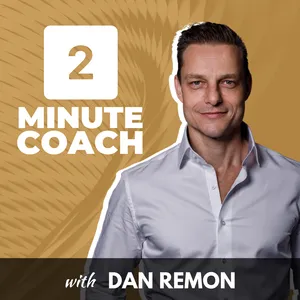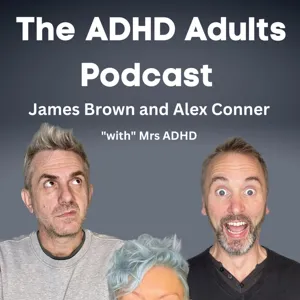How to practice 'deep reading'

Learn more about sponsor message choices: podcastchoices.com/adchoices
NPR Privacy Policy
Explore "distraction" with insightful episodes like "How to practice 'deep reading'", "717: How to be Productive", "EP 203: Prioritize Distractions for Effective Time Management", "Beyond the ‘Matrix’ Theory of the Mind" and "Meditation Party with Sebene Selassie and Jeff Warren: Psychedelics, ADHD, Waking Up From Distraction, and Singing Without Being Self-Conscious" from podcasts like ""Life Kit", "Syntax - Tasty Web Development Treats", "2 Minute Coach with Dan Remon", "The Ezra Klein Show" and "Ten Percent Happier with Dan Harris"" and more!


We’re kicking off 2024 by talking about productivity tips we’re using to stay focused, to do apps, calendars, focus states, and customizing our code editor.
Syntax: X Instagram Tiktok LinkedIn Threads


Some thoughts on how humans think, how economies grow and why the technologies we think will help so often hurt.
Column:
“Beyond the ‘Matrix’ Theory of the Mind” by Ezra Klein
Episode Recommendations:
Maryanne Wolf on how reading shapes our brains
Cal Newport on the problems with the way we work
My A.M.A. on A.I.
Gary Marcus on the limits of A.I.
Thoughts? Guest suggestions? Email us at ezrakleinshow@nytimes.com.
You can find transcripts (posted midday) and more episodes of “The Ezra Klein Show” at nytimes.com/ezra-klein-podcast, and you can find Ezra on Twitter @ezraklein. Book recommendations from all our guests are listed at https://www.nytimes.com/article/ezra-klein-show-book-recs.
“The Ezra Klein Show” is produced by Emefa Agawu, Annie Galvin, Jeff Geld, Roge Karma and Kristin Lin. Fact-checking by Rollin Hu. Mixing by Sonia Herrero. Original music by Isaac Jones. Audience strategy by Shannon Busta. The executive producer of New York Times Opinion Audio is Annie-Rose Strasser.

Welcome to Round II of the Meditation Party. The feedback we got from our first episode was overwhelmingly positive, so we’re going for it again. Meditation Party is an experiment we’re running with a chattier format – more of a morning zoo vibe, but way deeper, of course. The real agenda here is to show that meditation doesn’t have to be a solo death march; it is vastly enhanced by having friends.
Dan’s co-hosts in this episode are his two close friends: the great meditation teachers Sebene Selassie and Jeff Warren. Sebene Selassie is based in Brooklyn and describes herself as a “writer, teacher, and immigrant-weirdo.” She teaches meditation on the Ten Percent Happier app and is the author of a great book called, You Belong. Jeff Warren is based in Toronto and is also a writer and meditation teacher who co-wrote the book, Meditation for Fidgety Skeptics with Dan Harris. Jeff also hosts the Consciousness Explorers podcast.
In this episode, we talk to Jeff about what it’s like to be a meditation teacher who has ADHD. And even if you don’t have ADHD, there’s a lot of practical value to this conversation, because we all have unruly minds, and Jeff has found some great ways to work with this condition.
We also take listener questions, discussing topics like drugs. Specifically, psychedelics — and whether you’re violating Buddhist precepts if you take them. We also talk about how frustrating it can be to repeatedly wake up from distraction in meditation.
And finally, we have a segment talking about the stuff we’re psyched about right now… in which Sebene sings for us.
Full Shownotes: https://www.tenpercent.com/podcast-episode/sebene-selassie-jeff-warren-601
See Privacy Policy at https://art19.com/privacy and California Privacy Notice at https://art19.com/privacy#do-not-sell-my-info.

Episode 75 is another superfluous Thursday episode as The ADHD Adults again double-fist two episodes in a week, this time on ADHD and headaches. The Week in ADHD (11) includes how our week has gone, questions from YOU our listeners, plus some extended thoughts on the week's subject, ADHD and headaches. Alex and James can't buy bread and Mrs ADHD thinks Hannibal wasn't real...
Written by James Brown, Alex Conner and Sam Brown.
Produced by James Brown and JBHD Ltd.
Social media contacts: @theadhdadults
--- Send in a voice message: https://podcasters.spotify.com/pod/show/theadhdadultspodcast/message
We are living through a crisis of distraction. Plans get sidetracked, friends are ignored, work never seems to get done. You sit down at your desk to work on an important project, but a notification on your phone interrupts your morning. Later, as you're about to get back to work, you receive an email that you need to reply to. At home, screens get in the way of quality time with your family. Another day goes by, and once again, your most important personal and professional goals are put on hold. What would be possible if you followed through on your best intentions? What could you accomplish if you could stay focused? What if you had the power to become ‘indistractable?’
My guest on today’s conversation is an international bestselling author, former Stanford lecturer, and behavioral design expert, Nir Eyal. Nir started his career by helping tech-companies develop products that are intentionally habit-forming. Now, Nir has written a new book, Indistractable: How To Control Your Attention and Choose Your Life, which explains how to get the best of technology and reclaim your attention, without letting it get the best of you.
Nir believes that we all have the power to become indistractable and in today’s conversation he reveals how. He explains what really drives human behavior and why ‘time management is pain management’. Nir also shares actionable techniques that will help you design your time, realise your ambitions, and live the life you really want.
I hope you find this conversation empowering.
Show notes available at: https://drchatterjee.com/120
Follow me on instagram.com/drchatterjee/
Follow me on facebook.com/DrChatterjee/
Follow me on twitter.com/drchatterjeeuk
DISCLAIMER: The content in the podcast and on this webpage is not intended to constitute or be a substitute for professional medical advice, diagnosis, or treatment. Always seek the advice of your doctor or other qualified health care provider with any questions you may have regarding a medical condition. Never disregard professional medical advice or delay in seeking it because of something you have heard on the podcast or on my website.
Hosted on Acast. See acast.com/privacy for more information.

If you’re like me, you have a love-hate relationship with your digital devices. On the one hand, they give us access to unlimited amounts of information, connect us with friends and family, and allow us to work from pretty much anywhere. On the other hand, they can captivate our attention so much that we feel distracted and angsty. And try as we might, we often find it hard to ignore the itch to stop scrolling through Instagram and really listen to what a loved one is saying. Why do these devices feel so dang addictive?
My guest today is a neuroscientist who’s studied that question in depth. His name is Adam Gazzaley and he’s the founder of Gazzaley Labs at the University of California at San Francisco. There, he and his team have researched what goes on in our brains when we use our digital devices, why they distract us, and what we can do about it.
Today on the show, Adam and I discuss the science of distraction and focus. Adam walks us through the cognitive functions we use to focus our attention and to avoid distraction. He then explains why these evolved cognitive functions are mismatched to today’s constantly buzzing digital devices, using a theory of optimal food foraging borrowed from biology. We then discuss action steps grounded in science on how you can beat distraction and stay more focused throughout the day. We end our conversation talking about Adam’s work creating prescription video games (yes, prescription) that can be used to help elderly patients and individuals with ADHD.
Stay up to date
For any inquiries, please email us at hello@podcastworld.io